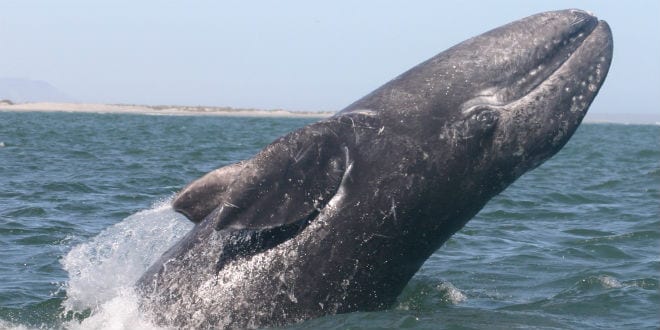Humans can’t hear their sounds while sitting on the beach, but whales are known by marine scientists to vocalize in a type of “singing.” Different types of these creatures sing different songs. The word “song” refers to a pattern of regular and predictable clicking sequences made by some species of these huge sea mammals – possibly to communicate male fitness to potential female mates or to enable groups of whales to coordinate sequences that communicate the identity of a single whale to other whales in its group. This clicking sequences reportedly allow the groups to coordinate their foraging of food.
An international team of researchers including some from the University of Haifa have launched a five-year project to understand the language of sperm whales and perhaps om the future even to communicate with them.
It is already known that sperm whales sing in a “dialect” that they learn as local culture. Whale songs by a variety of species sound a bit similar to humans, but there are subtle differences among them. Do they pass them from generation to generation genetically, or do they learn them?
Researchers from, City University of New York (CUNY), Harvard University, the Massachusetts Institute of Technology, the University of Haifa, and other partners have just held a press conference in Dominica, the northernmost of the Windward Islands in the Caribbean, to announce their marine project.
Named CETI (Cetacean Translation Initiative) project, the multidisciplinary effort will last at least five years, combining knowledge from the fields of marine biology, marine acoustics, artificial intelligence, linguistics, and more. The researchers will use innovative underwater robots and dive for hundreds of hours to study the whales, which weigh up to 50 tons and are 18 meters long.
The shortcode is missing a valid Donation Form ID attribute.
The whales make clicking sounds while hunting and other sounds at different frequencies when they are in the company of other whales. This is probably a kind of social activity in a tribal structure.
But marine biologists don’t know if these are just simple codes of communication or perhaps a real language because their databases are not big enough to decide. In light of the advancement of artificial intelligence and computer learning capabilities, the team came up with the idea that if they can gather enough information about the songs and their social context – the connection between certain sounds and certain behavior – they could develop algorithms that determine whether the songs are a language or not.
“And, of course, our big dream is that if it turns out to be a language, we may be able to communicate with whales,” said Prof. Dan Tchernov of the Leon Charney School of Marine Sciences at the University of Haifa who the operational director of the project and a member of the scientific committee.
The scientist in charge of the unique project is CUNY Prof. David Gruber. Other leading names are Shafi Goldwasser, an Israeli-American computer scientist and winner of the Turing Award nine years ago and are a professor of electrical engineering and computer science at MIT and the University of California at Berkeley. She specializes in computer science and decoding ciphers.
The shortcode is missing a valid Donation Form ID attribute.



